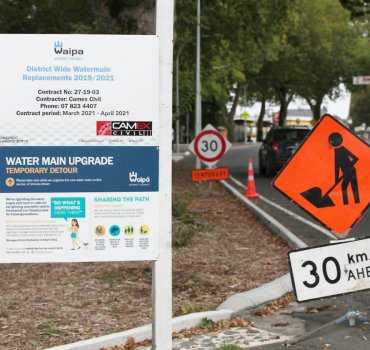
The council is borrowing to pay for a huge capital expenditure programme.

The council is borrowing to pay for a huge capital expenditure programme
Waipā District Council ratepayers may be facing lower proposed rate increases than others around the country and staff say that is partly because of growth.
Council is consulting on its draft Long-Term Plan which proposes an average annual rates increase across the district of 1.8 per cent over 10 years. There would be a maximum average increase of 4.2 per cent in the first two years.
Chief financial officer Ken Morris said the amount collected in rates over the next decade would be supplemented by revenue from fees and charges, subsidies and development contributions paid by property developers.
Proposed Waipā rates rises were low in comparison to some other places partly because of district growth, he said.
“On a percentage basis, Waipā has higher growth than many other parts of the country. That keeps our rates lower because there are more ratepayers to help pay for the services we provide. And the additional capital value of many new houses for example, spreads the costs over a wider base,” Morris said.
“If so many people weren’t moving here, our rates would need to be higher to pay for the same level of service.”
He said Waipā had managed its finances prudently, and that was also contributing to the lower proposed average rates increase
“Waipā has very good credit control processes and our rates arrears compared to some other councils is very low. That helps. In terms of cashflow, we are prudent when it comes to borrowing, only borrowing when we have to. Otherwise we use cash reserves so the benefit goes back immediately to ratepayers.”
Waipā has had lower debt than many other councils for years. It is forecast to peak in 2027/28 at $304 million.
“We need to borrow to pay for a huge capital expenditure programme. Borrowing to pay for that work, rather that rating people to pay for it, is the fairest way. It means we spread the costs over many years, rather than just piling them all on to those ratepayers who happen to live in the district right now,” Morris said.
“But despite debt going up, we have plenty of headroom; in fact Council could borrow a further $108 million in the peak year if necessary before we reach our debt limit. And of course now is a very good time to borrow because interest rates are so low.”
Morris believes Council has done “a pretty good job” delivering a huge range of services and with ony “modest” rates increases proposed.
“Council has maintained the district’s infrastructure well and invested where necessary but we are able to, and can, provide some very good community services to our community. Waipā faces many of the same challenges as other councils but we have been able to manage those well. Overall, while no-one welcomes increases rates, I think an average of 1.8 per cent over 10 years is pretty good.”








